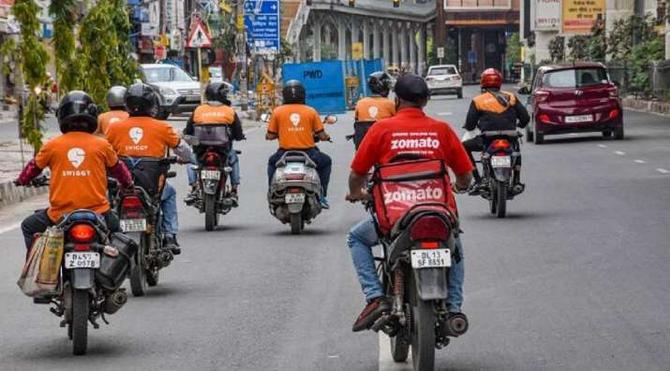Something is cooking in online food delivery. After 15 years of grappling with the demands of the business — read cash burn — Gurugram-based Zomato reported its first profit in the first quarter of 2023-24 (FY24).

Not satiated, it reported a profit in the following quarter as well: Of Rs 36 crore in the second quarter compared to Rs 2 crore in the first.
A year ago, in the second quarter of FY23, it had reported a loss of Rs 251 crore.
Zomato’s unlisted rival, Bengaluru-based Swiggy, said it had turned its food delivery business profitable in the March quarter, after a journey of nearly nine years, although it is yet to do so on a consolidated level, meaning in the aggregated reporting of all its business entities.
So, what is new on the menu? Maybe nothing.
“What Swiggy provides is the delivery of a fundamental need, food — which people care about and need every single day,” said Ervin Tu, interim chief executive officer (CEO) of Prosus, Swiggy’s largest investor, during a recent call with analysts.
Prosus’s trading loss in Swiggy fell to $208 million in the first half (H1) of FY24, compared to $321 million in the corresponding period a year ago.
In August, US-based asset management firm Baron Capital marked up Swiggy’s valuation by 33.9 per cent.
Two months later, Invesco, another US-based fund manager, marked up Swiggy’s valuation by 43 per cent, after having slashed it twice in four months this year.
Margin call
Both Swiggy as well as Zomato have shifted focus towards margin improvement.
This included retrenchments, be it in the form of layoffs, shutting down unviable business verticals, reducing commissions to delivery workers, or reshuffling their boards.
Both now charge a platform fee of Rs 2 to Rs 3 on each order, irrespective of whether the users are enrolled in their subscription plans.
“This change, which required a few quarters to implement, has enabled them to build a strong infrastructure and create a sustainable business model,” says Anirudh A Damani, managing partner, Artha Venture Fund, a micro-VC fund.
This is evident in their cash reserves.
Zomato’s cash burn went from Rs 197 crore in Q3 FY23 to a surplus of Rs 64 crore in the September quarter this year.
Likewise, Swiggy’s monthly cash burn reportedly came down to $20 million in March from the $45-50 million it was losing each month during 2021.
Quick commerce
Both Zomato and Swiggy started out as food aggregator platforms, but owe their turnaround, at least to an extent, to improvements in their quick commerce verticals: Blinkit for Zomato and Instamart for Swiggy.
Blinkit turned contribution-positive for the first time ever for the whole quarter in Q2 FY24.
Senior managers at the company say they are now “seeing profitable economics not just at a store level but also at a city level”.
Contribution-positive is a term new-age ecommerce companies use to measure the profitability of a business at a per-order level.
For Blinkit, contribution counts as revenue minus costs such as store operation expenses, delivery costs, waste and packaging costs.
Admittedly, the festival season drove “much stronger” growth for quick commerce as compared to food delivery for Zomato.
Zomato’s CEO Deepinder Goyal has said Blinkit will drive more value for shareholders in the next 10 years than Zomato.
This, he said, was because the quick commerce vertical’s gross order value growth in some cities had been faster than the food delivery business’s.
Swiggy’s CEO Sriharsha Majety says investments in its quick commerce vertical, Instamart, are finally bearing fruit and the business was on track to hit contribution neutrality.
“The peak of our investments is behind us and today, Instamart is one of the leading players in the quick commerce space globally,” Majety had stated earlier this year.
Despite the growth trajectories of their quick commerce arms, profitability for Blinkit and Instamart is still some way off.
Becoming fully cash-flow-positive would require further operational efficiency and margin improvement.
The key to success in quick commerce, Artha’s Damani says, lies not just in margin optimisation but in effectively monetising the convenience it offers.
“Swiggy and Zomato would benefit significantly from adopting a strategy that emphasises charging for convenience,” he says.
Side dishes
Both Zomato and Swiggy have routinely experimented with new business verticals to find new avenues for revenue generation.
Things did not always work out.
Swiggy’s premium grocery service Handpicked, cloud kitchen business Kitchens@ and its meat delivery service did not really fly.
But Swiggy Genie, the company’s parcel service, and Dineout, its offline restaurant scouting and booking service, have contributed meaningfully to the margins.
Zomato’s Hyperpure, its business-to-business arm for merchants and restaurants to fulfill their inventory, and its going-out business have become its mainstays.
Their subscription programmes, Zomato Gold and Swiggy One, have also been hits, though they have not been healthy for the margins.
A Gold order is currently less profitable than a non-Gold order.
“Global models like Amazon Prime have proven that subscriptions can be a meaningful source of revenue and customer retention,” says Ninad Karpe, partner and co-founder, 100X.VC, an early stage investment platform.
Experts say that Swiggy and Zomato have well and truly hit their stride.
“Much like large ships that take time to change course, these companies have successfully recalibrated their strategies towards profitability.
"This momentum, once gained, tends to be self-sustaining,” says Damani.
However, sustaining the current growth momentum cannot be taken for granted.
The duo is also yet to figure out the Tier-II and beyond formula, which can provide an exponential boost.
Right now, though, the aroma is good.











